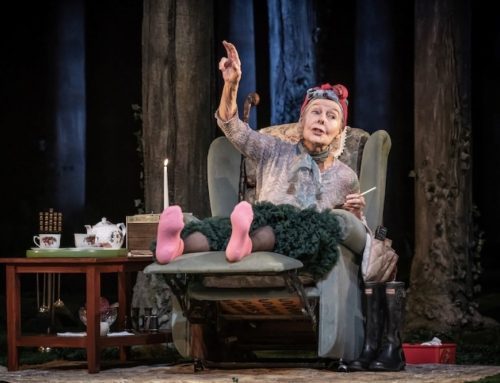Writer: Azuka Oforka
Director: Patricia Logue
Playwright and screenwriter Azuka Oforka’s notable debut play, The Women of Llarumney, transfers to Theatre Royal Stratford East following a sold-out run at Cardiff’s Sherman Theatre. Set in 18th-century colonial Jamaica, the play explores the fight three women face in surviving the brutalities of slavery, patriarchal oppression, impending insurrection, and the collapse of old certainties. Quality performances and heaps of humour leaven a bleak but vital lesson in historical injustice. The piece reminds us of the need for constant vigilance to avoid complicity in unspeakable evil. Emotionally, it buzzes. Dramatically, it is not without flaws.
The Machiavellian struggle of mixed-race, enslaved housekeeper Annie (Suzanne Packer, fizzling with grit and determination) to gain her freedom at almost any cost carries the emotional heft of The Women of Llarumney. Over twenty years, the woman has learnt that proximity and over-amicable subservience to drunken and dissolute Elisabeth (Nia Roberts), owner of Llarumney sugar plantation, is her only conceivable route to manumission. “If you’re in the big house, you can manipulate the system,” Annie assures the querulous, rebellious, darker-skin housemaid Cerys (Shvorne Marks). “You’re a fool that don’t even know she’s a slave”, retorts the heavily pregnant Cerys.
The revelation of a family connection between the two enslaved women emphasises what Annie has sacrificed in her quest for survival. Sometimes, even a mother’s love for her daughter is an act of risk-laden revolt. Whether Elisabeth is to be trusted hangs heavy; Annie is one of her most valuable assets. When push comes to shove, what is the price of friendship?
Something, it emerges, is rotten in the state of Llarumney, and it is not just the stinking edifice of enslavement. The dining room walls are mouldy, the balcony is rickety, the drumbeats of insurrection are loud and unmistakable, and a fungus infects the sugar cane. Permanently hungover, Elisabeth, whose waking hours are mostly spent eating, drinking, f-bombing (do not anticipate period language), and fornicating, is up to her eyeballs in debt. No crop means no sugar, no money and no future for Llarumney. A desperate fight for survival ensues, but at what cost and to whom?
Of course, the stakes are not the same for these women. Elisabeth’s worst nightmare is marriage to the “rancid old walrus”, Mr Ainsworth (Matthew Gravelle takes all three male roles, each a representative trope of the patriarchy), or an unwanted return to a dull, impoverished existence in rural Wales. Cerys and Annie face a lifetime of enforced servitude and the prospect of leaving the relative comfort of the big house for the inhumanities of the plantation (frustratingly, almost all of which we are told about rather than see).
The first half of The Women of Llarumney sits firmly in meat and potatoes Upstairs Downstairs territory, with a mix of gossipy humour, intrigue, and deftly interwoven exposition. Beholden to the whims of their mistress, Cerys and Annie serve elegant breakfasts (food, or its absence, is an ongoing motif here), top-up Elisabeth’s rum punch, and find wily ways to assert themselves and gain favour. Elisabeth’s scheming preoccupations with the ins and outs of island society adeptly remind us that those at the top of a system of oppression are as stratified as those at the bottom: she is very much a woman in a man’s world.
The second half sees a tonal gear change. The humour is mostly gone. Elisabeth pitches up in a crimson dress (set and costume design from Stella-Jane Odoemelam is top-notch): quite literally ‘a scarlet woman’ whose ever more scandalous behaviour defies patriarchal norms. “This island made a monster out of me,” she says. You may feel she was probably a monster before she arrived.
Twists, turns, and betrayals follow. Director Patricia Logue places the enslaved women on stage, silent, looking on during Elisabeth’s desperate drive to save the estate. This deft conceit, one of many smart directorial touches, speaks of the invisibility of enslaved people and their fundamental inability to enact agency in unfolding events, even as freedom through mutiny beckons.
Nia Robert has a hard task with Elisabeth. The character is an odd mix of Blanche DuBois and Sarah Ferguson. Roberts plays her with a kind of Bette Davis imperiousness. The performance, strident, impressive, and charismatic as it is, comes across as almost cartoonishly big and is not helped by dialogue that periodically threatens to spiral into melodrama. Anachronisms jar, too. ” Give me time to set up other streams of income,” she demands of the lecherous former indentured worker-turned-businessman Tommy Flynn. It is hard to accept that anyone would believe or trust this character’s words, making the emotional showdown at the play’s climax hard to credit. Would a character this larger-than-life treat the men around her with such apparent naiveté? Character gripes aside, this is an impressive debut work.
More Recent Reviews
The Women of Llarumney. Stratford East.
Writer: Azuka Oforka Director: Patricia Logue Playwright and screenwriter Azuka Oforka’s notable debut play, The Women of Llarumney, transfers [...]
Kitty Dollparts. Camden People’s Theatre.
Writer and Director: Rhiannon Lucy Bird Rhiannon Lucy Bird's short one-woman performance piece, Kitty Dollparts & Other Performing Objects, [...]
Sisyphean Quick Fix. Riverside Studios.
Writer: Bettina Paris Director: Nicky Allpress Sisyphean Quick Fix, performer Bettina Paris’ debut work as a writer, premiered at [...]




